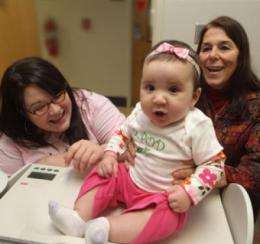Parenting stress affects new mothers’ postpartum lifestyle

Post-pregnancy excess weight is likely caused by the impact of new parenthood stress on physical activity, Georgia Health Sciences University researchers say.
In a study of 60 first-time mothers, researchers linked higher post-pregnancy body mass index – weight in relation to height – to a combination of a high BMI before pregnancy, excessive weight gain during pregnancy, parenting stress and a sedentary lifestyle, according to a study published in Women & Health.
The study gauged parental stress by asking participants to rate statements such as “I feel like I have less time to myself” and “I enjoy being a parent.” They were also asked to recall their physical activity over the previous 24 hours, categorizing that activity from light to vigorous.
“Sedentary lifestyle, or a low amount of physical activity, was most influenced by the type of parenting stress the mothers reported,” says Dr. Deborah Young-Hyman, behavioral psychologist with the Georgia Prevention Institute. “More parenting stress, especially depression, was associated with less physical activity and a higher postpartum BMI.”
Interestingly, social interaction, generally considered a measure of well-being, correlated with a higher body mass index, she noted.
“We think women are socializing with their friends, not isolating themselves, but they are doing sedentary things like talking on the phone, watching television or hanging out at home, instead of taking their babies on a walk together.”
New moms with a higher BMI did report more depressive symptoms, but overall felt competent as parents. Those with lower BMIs reported more physical activity (and less depressive symptoms) but more concern about their competence as parents.
“We know that physical activity improves your mood and helps you lose weight, but no one has ever asked how physical activity is related to parenting stress in first-time moms,” Young-Hyman said. “The bottom line is that parenting stress does impact the postpartum lifestyles of new moms,” she said.
Based on a current study tracking how first-time mothers adjust to parenthood, researchers will develop an intervention to help new moms create healthy lifestyles for both themselves and their babies – preventing overweight mothers and children.



















